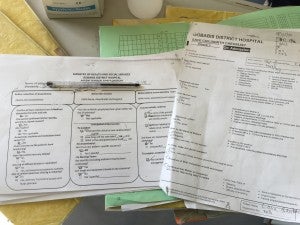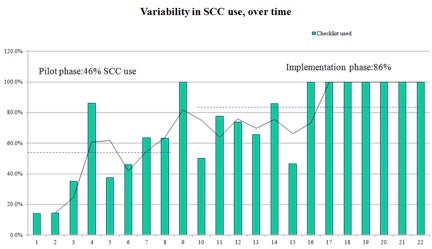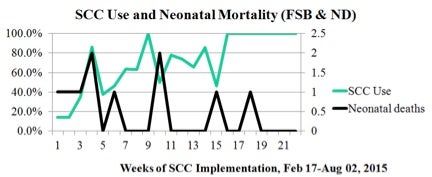Two years ago, Dr. Leonard Kabongo set out to improve the quality of childbirth care for women and infants at the Gobabis District Hospital in Namibia using the World Health Organization’s Safe Childbirth Checklist. With support from Ariadne Labs, Dr. Kabongo led a year-long checklist implementation effort that has transformed childbirth delivery in the hospital and resulted in remarkable reductions in childbirth mortality and complications.

Gobabis District Hospital lies near the border of Namibia and Botswana, in the Omaheke Region of eastern Namibia. As the largest government-run medical facility in the region, it serves some 73,000 patients and delivers an average of 2,200 babies a year. Despite years of efforts to improve maternal and perinatal outcomes across Namibia, unacceptable rates of death and complications have persisted at Gobabis District Hospital with maternal mortality at 153/100,000 live births, stillbirths of 9.7/1000 live births and early neonatal mortality of 12/1000 live births.
“These numbers reflected the complexity of the issue but were not far from what is already known as the causes of maternal and neonatal deaths,” said Dr. Kabongo, who is the Senior Medical Officer and specializes in maternal health. “For me, reducing the numbers is what we have been trying for years with skill transfer programs, training of midwives, improving referral systems,etc. Improving quality of care during the birthing period appeared to be the most important element. Doing the right thing, right away, was the missing code.”
Dr. Kabongo designed a patient flow diagram to identify problem areas and then initiated a root cause analysis to understand factors contributing to poor outcomes. He identified the following causes: poor adherence to essential safe childbirth best practices among hospital staff due to deficits in skills and knowledge, and poor integration of quality improvement strategies in routine clinical practice. Despite years of skills trainings and an increasingly more reliable supply chain, something was not sticking. Dr. Kabongo saw a window of opportunity to act and implement change with the WHO Safe Childbirth Checklist as the catalyst.

As a quality improvement champion, Dr. Kabongo began working with Ariadne Labs’ BetterBirth team to learn more about the WHO Safe Childbirth Checklist and implement a pilot project. Scientists at Ariadne Labs have had a leading role in the development, testing, implementation and spread of the Checklist around the world. The Safe Childbirth Checklist outlines 28 essential standards of care that all women should receive from birth attendants during childbirth. The practices — ranging from handwashing to proper administration of oxytocin to skin-to-skin contact directly following birth — address preventable causes of death during childbirth, including hemorrhage, infection, obstructed labor and asphyxia.
This approach was already familiar to Dr. Kabongo, who had been implementing the WHO’s Surgical Safety Checklist at his hospital for some years. With remote coaching from experts at Ariadne Labs, Dr. Kabongo began introducing the Safe Childbirth Checklist to hospital staff in late 2014. The strategy for improvement was designed in two phases, first an 8-week pilot phase to understand integration of the SCC into clinical practice and to gather a baseline understanding of best practice adherence, and second an implementation phase (weeks 9-22), during which data-informed coaching was deployed to address barriers to safe childbirth best practice adherence. Initially, Dr. Kabongo coached nurses. Then, nurse quality improvement champions were identified to carry out peer-to-peer coaching among facility staff.
Dr. Kabongo’s 22-week quality improvement project increased birth attendant use of the SCC, from an average of 46 percent in the pilot phase, to an average of 86 percent in the implementation phase. Individual best practices, like proper handwashing, tray preparation, and administration of oxytocin increased over the course of coaching.
Following the 22 week quality improvement project, Dr. Kabongo decided to continue peer-to-peer coaching and collecting and sharing data with staff to stimulate improvement as an integrated component of care at Gobabis District Hospital. After one year of SCC implementation, maternal mortality has reduced to zero (0/100,000 live births), fresh stillbirths have reduced to 5/1,000 live births, and early neonatal deaths have reduced to 8/1,000 live births. While these reductions cannot be attributed to the Checklist alone, said Dr. Kabongo, these data demonstrate dramatic improvement in just in one year and remarkable advancement in meeting the new country-level United Nations Sustainable Development targets for maternal and neonatal mortality.
For Gobabis Hospital staff, the day-to-day experience of assisting mothers in delivering their babies has also become more empowering. Testimonials from nurses and coaches praise the Checklist implementation for helping them make better decisions about referrals, improve preparation, and use peer-to-peer coaching to strengthen adherence to safe birthing practices.
The exciting results from Dr. Kabongo’s trial at Gobabis District Hospital point to the potential for large-scale, national impact throughout Namibia. As part of a worldwide effort to promote essential birthing practices, a team from Ariadne Labs traveled to Namibia in July 2015 to meet with the Ministry for Health Quality Assurance and assist with SCC implementation beyond the Gobabis region. They also met with the Regional Medical Office and spent a few days at Gobabis District Hospital to understand what had worked and why, looking for areas for improvement when implementing the SCC at other sites.
“As with many of our tools and products, we learned that a collaborative checklist adaptation process involving maternity nurses, ongoing training beyond the SCC launch event, and coaching support were critical to success,” explained Ariadne Labs Global Access Manager Nabihah Kara.
Based on the recommendations and results from Dr. Kabongo’s trial, the Ministry has committed to rolling out the Safe Childbirth Checklist program nationally using the BetterBirth coaching model for quality improvement. Several engagements and consultations between the Ministerial Health authorities, other Namibian District Hospitals and Gobabis District Hospital are ongoing to plan for an effective national rollout.
–By Antonia Chan
Join Ariadne Labs on June 15 for a webinar with Dr. Kabongo to learn more about the implementation process in Gobabis.
For more information on Safe Childbirth Checklist implementation, please email info@ariadnelabs.org. Download the Safe Childbirth Checklist and Implementation Guide in English, French or Spanish here.




